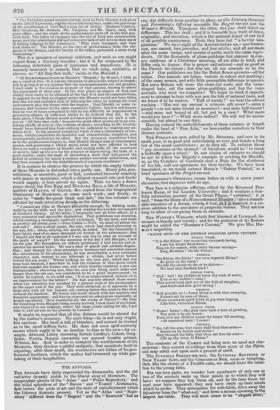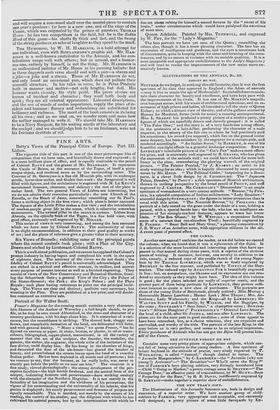THE ANNUALS.
THE Annuals have fairly superseded the Almanacks, and the old red-letter dynasty yields to the liberal sway of literature. The copperplate glories of the "Atlas " and "Polite Repository," and the inlaid splendour of the" Raven" and " Thumb " Almanacks, fade before the pride of art and the taste of embellishment which the Literary Annuals present. Yet as the " Atlas " and " Repo- sitory " differed from the " Regent " and the "Souvenir" but as one star differeth from another in glory, so the Literary.Souvenir and Priendship's Offerings resemble the Forget-me-not and the Winter's Wreath. Transpose the titles, and yo i.; shall detect no difference: ' This is a fault ; and it is traceable' to a want of fancy, originality, and invention, which is the national defect of our best of all possible countrymen. Truly they have but " a bovine km-. gination." We have eight of the Annuals before us,— one humor- ous, one sacred, two juveniles, and four adults; and ail are made after the same recipe, and consist of pretty much the same ingre- dients. Of the thousands of plum-puddings that simmer in cop- per caldrons of a Christmas morning, all are alike in kind, and differ only in degree: this is proper and national—and as good as the French tri-colour ; but why are all our annuals to be the same ? Our publishers are like the Dutch flower-growers—all for tulips. Our annuals are tulips, various in colour and marking; of the same genera, and with little perceptible difference in species. But since Britons will wear the same-cut coats and the same- shaped hats, eat the same plum-puddings, and buy the same annuals, why need we complain? We begin to think it imperti- nent to attempt to turn with our pen the tide of national taste, and we know it to be useless. "Talk of variety !" we hear the editors exclaim : "Has not my annual a crimson silk cover ?—mine a purple ?—is not mine bound in morocco?—and mine half-bound? —and mine not bound at all, but put in a case ? What more would you have ? "—What more indeed! We will not be unrea- sonable, but attend to our duty.
• Having noticed the embellishments of these volumes at length under the head of "Fine Arts," we here confine ourselves to their literary contents.
THE FORGET-ME-NOT, edited by Mr. SHOBERL, and now in its ninth year, is as good and entertaining as ever, and boasts a long list of the usual contributors ; as do they all. To criticise these " gay creatures of the element" of literature, would be "to break a butterfly upon a wheel." In our choice of extracts we should be apt to follow his Majesty's example in pricking for Sheriffs, or, as the Conclave of Cardinals elect a Pope for the shortness of his life, cull our specimens for their brevity.. We have been forestalled, or we-would extract HOOD'S "Painter Puzzled," as a brief specimen of the Forget-me-not.
FRIENDSHIP'S OFFERING comes before US with a seven years' character, that improves with its age. , THE IRIS is a religious offering, edited- by the 'Reverend Pro- fessor DALE, of the London University; • and it contains a fear- fully interesting account of the Great Plague, " extketed," it is said " frani the Diary of a NonconforrniSpkinis,ter, ;" also a remark- able :narrative of a dream, which, if true; ,e`S„),t4.`asserted, is ii.cu- ribus addition to the anecdotes,of prophetie,visions. Thei are.too long to allow of our giving them as extracts.
THE WINTER'S WREATH, which first bloomed at Liverpool, in- creases in beauty and variety ; and for the profusion of its flowers might be called the "Summer's Coronal." We give Mrs. HE- MAS'a inspiriting
"RHINE SONG OF THE GERMAN SOLDIERS AFTER VICTORY.
SINGLE VOICE.
"It is the Rhine ! our mountain vineyards laving,
I see the bright flood shine !
Sing on the march, with every banner waving—
Sing, Brothers ! 'tis the Rhine !
CHORUS.
"The Rhine, the Rhine ! our own imperial Rhine !
Be glory on thy track!
We left thy shores to die or to deliver—
We bear thee freedom back !
SINGLE VOICE.
" IIail ! hail ! my childhood knew thy rush of water, E'en as my mother's song ! That sound went past me on the field of slaughter, And heart and arm grew strong !
CHORUS.
"Roll proudly on !—brave blood is with thee sweeping, Poured out by sons of thine, When sword and spirit forth in joy were leaping, Like thee, victorious Rhine.
SINGLE VOICE.
"Home! home !—thy glad wave hath a tone of greeting, Thy path is by my home : Even now my children count the hours 'till meeting,
—0 ransomed ones ! I come!
CHORUS.
"Go, tell the seas, that chain shall bind thee never— Sound on by hearth and-shrine! Sing through the hills, that thou art free for ever—
Lift up thy voice, 0 Rhine."
The contents of the CAMEO not being new, we need not cha- racterize: they consist of millings from three years of the Bijou, and may safely rest upon such a ground of merit. The JUVENILE FORGET-ME-NOT, the JUVENILE SOUVENIR or NEW YEARS' Gm, and the CHRISTMAS Box, seem so tempting, that, like the choice of a Twelfth-cake, we should leave the selec- tion to the young folks. For our own parts, we wonder how purchasers of only one or two of the annuals make up their minds as to which they will have: we suppose they buy them all, and by the time those for next year have appeared, they may have made up their minds which to prefer. They monopolize the sofa-table, drive away the Infouterie from the "what-not," and form a mosaic covering to the largest loo-table. They will soon cease to be "elegant litter," and will require a rose-wood shelf over the mantel-piece to contain one year's produce : for here is a new one, and of the class of the Comic, which was originated by the prince of punsters, THOMAS HOOD: he has two competitors in the field, but he is the Robin Hood of this game—his shafts fly thick and fast, and the twang of the string produces an echo of laughter as they speed to the mark.
THE HUMORIST, by W. H. HARRISON, is a bold attempt for one individual, even with ROWLANDSON'S graphic aid. Mr. HAR- RISON is a well-known contributor to the Annuals, and his con- tributions range well with others; but an annual, and a humor- ous one, entirely by himself, is not the thing. Mr. HARRISON is an undisguised imitator of Mr. HOOD in his punning ballads: but in these doggrels each verse should end with a pun—a stanza and a joke—a joke and a stanza. Those of Mr. HARRISON do not, and only boast an occasional pun, which does not palliate their uncouth structure. In his tales in verse, he is Peter-Pindaric both in manner and matter—not only lengthy, but dulL His humour wants vivacity, his style point. His prose stories are barren of incident and character ; they want both body and spirit ; they are all external appearance. • Laboured descriptions, and the use of words of undue importance, supply the place of in- cident and humour: fluency and redundancy are substituted for brilliancy and richness. The merit of the book consists in its being all his own ; and as we read on, we wonder more and more how the author managed to write it. We should take Mr. HARRISON to be a Navy Surgeon, for his writing smells of the laboratory and the cockpit ; and we should judge him to be an Irishman, were not his Iricisms destitute of wit.



























 Previous page
Previous page